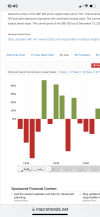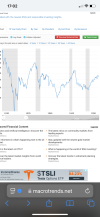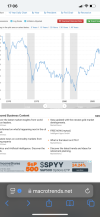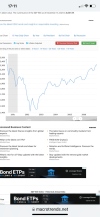I have a pension with Irish Life and am 7 years to retirement.
I noted today that I am now in 2 funds
Empower Growth Fund (Risk Rating 4)
Empower Stability Fund ( Risk Rating 2)
I am being "sheperded" into low risk funds the closer I get to retirement.
I will take an ARF self administered option when i retire so the above makes no sense.
Have been looking at putting 100% into their Indexed World Equity Fund (Risk Rating 6).
And problems with this approach that I may be missing?
I wrote this today in response to a post on linked in by David Blanchett

100% stocks for retirement? | David Blanchett
100% stocks for retirement? I’m a 100% meh on that one. There’s lots of research documenting the strong global historical performance of equities, especially US equities, especially over longer time horizons. I’ve done some research on this, such as a piece back in 2013 titled “Optimal...
 www.linkedin.com
www.linkedin.com
A key takeaway for those at the point of retirement is really this
If you look backwards for the source of highest investment return you will absolutely conclude that long term you should be invested in equites and US equities in particular and really just US tech stocks.
So our naïve retiree lashes their entire retirement fund into Nvidia because it’s the best investment to have held recently.
That’s deliberately making the point that providing a retirement income for the whole of the rest of one’s life is not about seeking out the source of the highest historical return. We are all wise after the event.
In a forward looking retirement plan you are really liability matching (your future income needs) over an unknown future time period (your actual life)
To solve this puzzle we can make an educated guess about future investment returns which in the very short term will be wrong, probably very wrong but overtime we would expect to mean revert so eventually we will be approximately right.
We will also, on average, by definition be approximately right with life expectancy, but again could be out by a decade or so either side of that average in practice. There is no best before date on your birth certificate.
So in the same way that investors should operate on the working assumption that markets are probably efficient enough that in practice index investing will most likely prove to be the best strategy for their equity investments, despite the fact that some managers might beat the index; they are highly unlikely to invest with the lucky managers.
Retirees should also diversify their accounts and include (some) lower expected return bonds because the goal is not to end up with the highest inheritance for your children it’s really to not run out of money if the next 5 or 10 years turns out to be like the 1930s for equity markets and you are a forced seller of declining stock values.
Of course if you have other sources of guaranteed income and or can turn off the income distributions then you may reach a different conclusion.
But for those people who are relying on their retirement funds they need a reliable and predictable source of returns over both the long AND the short term. Bonds and by extension, annuities, fulfil that short term role better (not perfectly) but better than equities.
In other words, in the early years of retirement sequence of return risk and the NEED to provide an income every month, trumps long term capital appreciation and legacy planning.
In fact you might even conclude from this that at the point of retirement we should be invested close to 100% in cash and bonds to provide the confidence that we can retire right now TODAY but, counterintuitively perhaps, as we age we can afford to take more equity risk because we are moving closer to the bequest stage and have a shorter term need for income.
Just to expand one point further with examples.
If you are a Civil Servant with a defined benefit pension of €60k pa and you have some AVCs then yes, objectively, you have a very high capacity for loss. Arguably the AVCs are not “needed” for retirement income and were most likely accumulated because of the tax break.
So under those conditions a high equity allocation in an ARF is perfectly rational and sensible because the primary motivation most likely won’t be a predictable income.
If we contrast that with someone who has a typical defined contribution pension of say €150k to €200k then they also objectively lack capacity for loss and should be considering an annuity for some or perhaps all of the pension fund.
So the conclusion is that the retirement decision is extremely investor dependent and, ex-ante, you can’t ever make generalisations that you should always have an equity bias in your portfolio even if, ex-post, it turned out that you would have been lucky with the benefit of hindsight.
It may be generally true of some and maybe even most investors but it’s certainly not always true for all investors.
And that’s why retirement advice is so personal.
Last edited:



